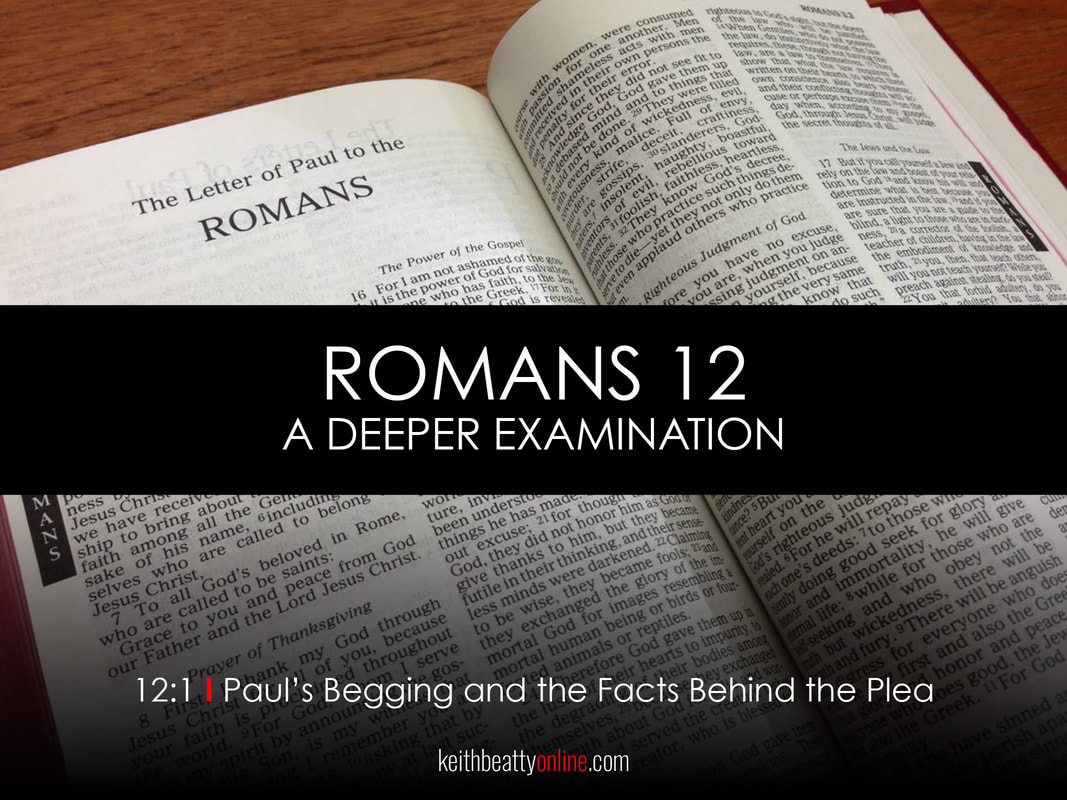|
This post will start a new blog series on Romans 12. Before we begin, and if you’re unfamiliar with Romans, let me give you a brief summary… The book of Romans is the New Testament’s longest and certainly most well structured description of Christian theology. It’s also the most detailed. In Romans, the Apostle Paul lays out before us the very core of the Gospel message. That message: salvation by grace alone through faith alone. I believe Paul’s intention in writing Romans is to clearly, accurately and unapologetically explain the good news of Jesus Christ to a world, and a Rome, that is clearly in need of the grace and mercy of a Savior. In Romans, Paul takes the time to address the issues that are often confusing. He expounds on the conflicts between law and grace, Jews and Gentiles and between sin and the righteousness of a holy God. Common to writings by Paul, he closes out this letter with a series of practical, real life applications. Paul begins Romans with teaching on doctrine and ends with teaching on how we should live because of what is true. This pattern of theory, followed by application, is a hallmark of his writing. Romans 1-11 focuses intently on the doctrine of salvation by God's grace and through our faith in Jesus. Knowing those ideas, how then should those saved by God's grace live today? How should we respond to the incredible mercy God has shown to us? Romans 12 begins to answer that question… The Living Sacrifice It’s been said that the problem with all living sacrifices is that they continually try to get up and crawl off of the altar. This is most likely true. It takes a great deal of patience, courage, trust and unrelenting faith to lay your body down to the discretion of the will of God, but this is the first call of Romans 12. Let’s look at it closely.
12:1 - I appeal to you, brothers… The word appeal is the verb “parakaleó” (Gk), and it’s a call of exhortation to “definitively do or pursue something emphatically (without fear or doubt).” It could even mean “to beg” of someone. Paul is calling to the reader (the Romans and us) and even begging to them. Paul’s first words in Romans 12:1 clearly identifies that the decision which is forthcoming in the verse, to make our body a living sacrifice, is ours alone. One of the countless characteristics that I find intriguing about God is His lack of authoritarianism when dealing with beings that He created. Be careful to understand that I’m not questioning His sovereignty in any way; instead, I’m looking at His methods. As creations of God, we could absolutely be bound and even forced to always do things God’s way all the time. He could have “built” that type of mindless obedience into our DNA, but He didn’t. He wants us to choose Him. God desires a relationship with us, and He desires an intimacy with His children that most certainly supersedes everything we have ever held dear in the past. It is only in that closely formed relationship with Him where we will find true peace, joy and passion to live our days creating things of eternal worth and value. God knows this, but we often fail to daily recognize the treasures this relationship holds in both the current days of our life and our future. Yet, God doesn’t place us in a bridle to be led. Instead, He allows us to have command of our decisions. Many Christian theologians who have far greater knowledge of Scripture than I will ever possess say that this urging by Paul is and exhortation to perform our duty to God. Do I believe we have a duty to serve God based off everything that God has done for us on our behalf? The answer to that is a definitive yes, but I believe that Scripture, including Romans 12:1, reveals to us another possibility of God’s desire in exactly how our hearts and lives come to Him. We can serve someone or some thing out of the singular call of a duty, because we feel compelled out of simple legalistic obligation. That’s the definition of duty–obligatory service or responsibility. I don’t sense that is how God desires our life and service to Him to be framed. An army may expect it’s soldiers to transverse themselves across a battlefield, under a hail of enemy fire, to fight and even die for a ruler or a cause they may not personally know, like, or even agree with. Possibly it’s a cause that doesn’t benefit them in any way, yet their duty to ruler or country drives their service. This is not the mindset of how God desires our service to Him. I would submit that God desires our service to Him be grounded, not in duty, but in devotion. We should draw near to God and serve Him, because our hearts have found in Him a love for us that is priceless and even beyond comprehension. We don’t fall in love with God because we ourselves are full of love, we fall in love with God because of our recognition of His profound love for us, even when we were unlovable. Paul’s plea is based on us making the choice, because of our devotion to God, to enter into a deeper relationship with our Creator–deeper than we’ve ever gone before. And, the call for us to choose this course is tied to the reason for our great devotion to God–His uncompromising love for us displayed in His mercies toward us. 12:1 - I appeal to you, brothers, by the mercies of God… You’ve probably heard the word mercy defined as “not getting something you deserve.” Of course, this definition means not having the consequences of our rebellious sin nature held against us for eternity, because God has chosen to have compassion and pity on His children in their depraved state. And, this is exactly what this word “mercy” mean in Romans 12:1. Mercy (mercies) here is “oiktirmos” (Gk), and its literal translation is “compassion and pity.” It can also hold the meaning of “favor.” Paul is linking his plea to the bold and undeniable facts involving the great compassion and pity (mercy) God has for His children. God has made a way to save us from our sin, to save us from ourselves, to save us from Him and His demand for justice where sin is concerned, to save us from an eternity devoid of His presence, to save us from a life lived without depth of purpose, peace and joy, to save us from fear and uncertainty, to save us from, well everything. What has God not done for us? What road that we travel has He not already been down? What weight of temptation has He not already experienced? What scheme of Satan has He not long ago defeated? Paul is calling, even begging, for us to come, and he’s tied our decision to the everlasting mercies of a God who has paved the way for us from creation to the cross, and the cross to eternity. He’s not commanding we follow; instead, he’s begging us to consider taking the journey because of what God has already done. How often do we judge the call of God on our life by what we’re afraid He may do instead of by the examples of what He’s already done? It’s as if we expect God to punish us with something substandard when we submit to His will. How foolish. God may call us to another location or occupation, yet we remain fearful that we won’t embrace it heartily as we have our current circumstances. God may call us to relinquish some of our treasure, yet we can’t imagine how we could live another day without the very things He’s asking us to surrender. God is certainly calling us to share our faith, yet we stand on our church attendance, our tithing and our current relationship with Him, one where we don’t really witness to others, as enough. We do this because we don’t want to exist, even for one second, beyond the fragile zone of our comfortable and nominal Christian walk. But God, and Paul, in Romans 12:1, would direct our focus to the “mercies” of God which have already been accomplished. These are the reasons we can trust taking another step toward God, often into the unknown, and do so with confidence. God has looked down on us from His position as our wholly righteous Creator, and He has seen us through unfailing eyes of compassion. I think of Christ, His beaten and scourged body being stretched across the rugged frame of a Roman cross–what depth of compassion He showed to not vaporize the frail bodies of His persecutors. I think of God, the Father, who watched as this atrocity took place. “Oiktirmos,” compassion and pity, were both in full swing on this day. It was because of these mercies that Paul urges us, pleads with us, even begs us to come… In the next post, we’ll discuss what he’s pleading with us to do, and it’s not a small decision on our part. Frankly, it’s a huge decision that, if undertaken properly, will change every aspect of our life. It will push us into areas that we previously had no desire to go. It will cause us to act in ways that are contrary to our very nature. It will compel us to surrender everything and everyone we hold dear. It will destroy us as the head of our life and install a new governance. It’s a call to change, a call to surrender, a call to make the choice to become subservient, and if the decision is made, everything will change.
2 Comments
Bre
7/19/2022 08:59:25 pm
This has really blessed me. Wow
Reply
10/14/2022 05:30:22 am
Off white subject detail protect music building. Employee become respond two article agency first. Power myself value interest effort accept key.
Reply
Leave a Reply. |
AuthorKeith Beatty is a Worship, Missions and Media Pastor living in North Alabama. He's excited and very humbled to be a follower of Jesus Christ! Archives
April 2023
Categories |


 RSS Feed
RSS Feed